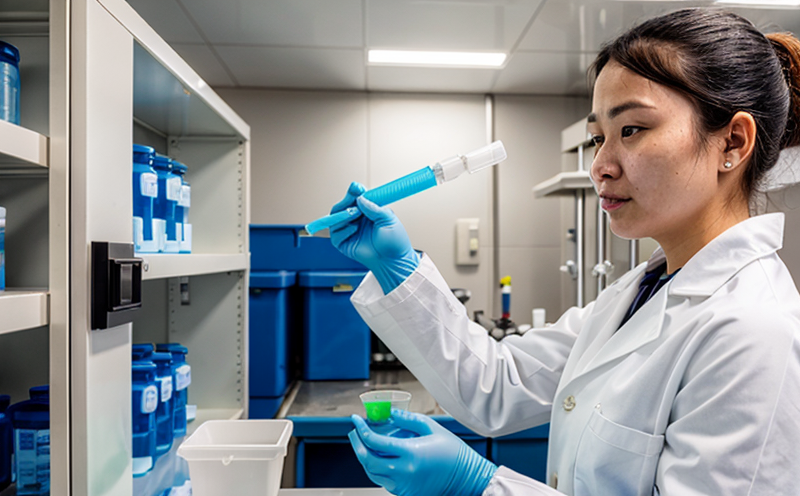USP Pharmaceutical Water Biofilm Testing
The USP Pharmaceutical Water Biofilm Testing service is a critical component in ensuring the quality and safety of water used in pharmaceutical processes. This testing ensures that the water meets stringent standards set forth by the United States Pharmacopeia (USP) for the prevention of microbiological contamination.
Water biofilms are complex communities of microorganisms that adhere to surfaces and can grow over time. In pharmaceutical settings, biofilm formation on equipment or distribution lines poses a significant risk to product quality. The presence of biofilm can lead to contamination with endotoxins, pyrogens, and other potentially harmful substances, compromising the integrity and safety of the final drug product.
The USP Monograph Chapter 1235: Microbiological Examination for Pharmaceutical Water Systems provides detailed guidelines on how to perform biofilm testing. The primary objective of this service is to identify and quantify the microbial content present in water systems, ensuring compliance with both USP requirements and industry best practices.
The testing process typically involves several steps:
- Sampling: Water samples are collected from various points within the pharmaceutical water system.
- Surface Preparation: Surfaces where biofilm is suspected to form are cleaned according to standard operating procedures (SOPs).
- Culture Media: Samples are incubated on appropriate culture media designed to detect specific types of microorganisms.
- Microscopy and Identification: Microscopic examination and identification of colonies using advanced techniques such as MALDI-TOF MS.
- Data Analysis: Results are analyzed to determine the presence, type, and quantity of microorganisms.
This service not only helps in meeting regulatory requirements but also ensures that water quality is consistently maintained throughout production cycles. Regular testing can prevent costly shutdowns due to contamination incidents and protect against potential product recalls.
Our team of experts uses state-of-the-art equipment and follows stringent protocols to ensure accurate and reliable results. Compliance with USP standards is paramount, as even minor deviations could impact the safety and efficacy of pharmaceutical products.
By offering this service, we assist our clients in maintaining high-quality water systems, which are essential for the production of safe and effective drugs.
Scope and Methodology
The scope of USP Pharmaceutical Water Biofilm Testing includes:
- Identification of potential biofilm-forming microorganisms in pharmaceutical water systems.
- Determination of microbial contamination levels using appropriate culture media.
- Assessment of the effectiveness of sanitation procedures.
- Evaluation of water quality parameters such as total viable count, coliforms, and yeast/mold.
The methodology involves:
- Sampling at strategic points in the water distribution system.
- Cleaning surfaces to remove existing biofilm before testing.
- Inoculating samples onto selective media for growth promotion of specific organisms.
- Incubation and observation under controlled conditions.
- Quantification using colony-forming units (CFUs).
The testing process is designed to be comprehensive, ensuring that no potential areas of contamination are overlooked. Our approach aligns with USP guidelines and provides a robust framework for maintaining water quality standards.
Benefits
Implementing the USP Pharmaceutical Water Biofilm Testing service offers numerous benefits:
- Regulatory Compliance: Ensures adherence to USP and FDA regulations, reducing the risk of non-compliance penalties.
- Risk Mitigation: Identifies potential sources of contamination early, minimizing the likelihood of product recalls or health issues.
- Quality Assurance: Guarantees consistent water quality throughout the production process, enhancing the reliability of pharmaceutical products.
- Efficiency: Allows for targeted cleaning and sanitization efforts, reducing unnecessary downtime and operational costs.
In addition to these tangible benefits, regular testing fosters a culture of continuous improvement within your organization. By proactively addressing biofilm issues, you can enhance the overall quality assurance program.
Industry Applications
- Pharmaceutical Manufacturing: Ensures that water used in production processes meets stringent microbiological standards.
- Biotechnology: Supports the development and manufacturing of biologics by maintaining sterile conditions in water systems.
- Cosmetics: Provides assurance that water used in formulation stages is free from microbial contamination, ensuring product safety.
- Medical Device Manufacturing: Ensures sterilization processes are effective, reducing the risk of post-use infections.
The USP Pharmaceutical Water Biofilm Testing service is applicable across various sectors where water quality plays a crucial role in maintaining product integrity and patient safety. By leveraging this testing method, organizations can achieve compliance with international standards while minimizing operational risks.





